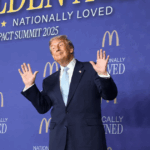
The simmering tensions between the U.S. and Mexico over border security and sovereignty escalated sharply this week after Mexican President Claudia Sheinbaum forcefully rejected the idea of U.S. military strikes against drug cartels operating within Mexican territory. Her remarks came in direct response to President Donald Trump, who on Monday said he would be willing to authorize cross-border action if that’s what it took to “save millions of lives” from the scourge of drugs entering the United States.
“It’s not going to happen,” Sheinbaum told reporters Tuesday, delivering an unambiguous message: Mexico’s sovereignty is nonnegotiable.
The diplomatic clash, though familiar in tone, is anything but routine in context. This is the first major public disagreement between Sheinbaum and Trump since she took office, and it arrives just as the two governments are trying to thread the needle between cooperative security policy and domestic political pressure on both sides of the border.
Trump, never one to shy from bold rhetoric, cited maritime success in interdicting drugs as proof that similar “targeted” operations on land could dismantle the cartels’ logistics chains. “Whatever it takes,” he said Monday. “If that means we go in and shut it down, that’s OK with me.”
Sheinbaum, who has taken a more technocratic and measured tone since assuming the presidency, acknowledged previous conversations with Trump on similar proposals—including his earlier suggestion during his first term of “designating cartels as foreign terrorist organizations” to enable military action. She reaffirmed that Mexico will only allow joint operations that respect its laws, borders, and leadership.
“We operate in our territory,” she said. “Intelligence sharing is welcome, but foreign troops will not operate here.”
The exchange came on the heels of a bizarre incident that may have compounded tensions. On Monday, unidentified individuals arrived by boat at Playa Bagdad in northeastern Mexico and installed signage declaring the area restricted U.S. Department of Defense property. The signs, written in English and Spanish, alarmed local residents, who reported them to authorities. The Mexican Navy quickly removed the signs, and Sheinbaum confirmed Tuesday that the International Boundary and Water Commission had been asked to investigate.
Early reports now suggest the signs were posted by contractors working for a U.S. government agency, likely related to the SpaceX Starbase facility just across the border in Boca Chica, Texas. Starbase, which has federal ties through NASA and the Pentagon, has been a source of tension before. In June, debris from a SpaceX test reportedly landed on Mexican territory—an incident still under investigation.
The riverbed near the disputed area frequently shifts, complicating the already sensitive border geography. But for Mexico, the signs—both literal and political—raise deep concerns about blurred lines between cooperation and incursion.
Further fueling the diplomatic fire is Trump’s revived push to rename the Gulf of Mexico as the “Gulf of America,” a symbolic gesture that Mexico has strongly opposed and mocked as nationalist theater. In that context, Sheinbaum’s rebuttal wasn’t just about military intervention—it was a defense of national dignity.
Still, the stakes remain high. Both countries are grappling with unprecedented levels of synthetic drug trafficking, surging migration, and border violence. Trump’s hardline posture resonates with his base heading into the 2026 midterms, while Sheinbaum must balance international pressure with growing nationalist sentiment at home.








